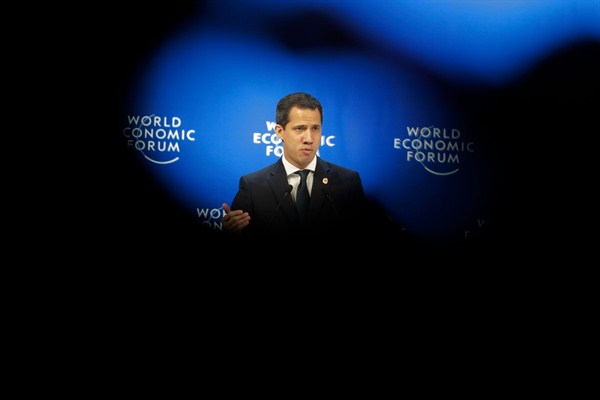Juan Guaido is on tour and looking presidential, visiting some of the more than 50 countries around the world that have recognized him as Venezuela’s legitimate interim president. In the past two weeks, the 36-year-old opposition leader made an official state visit to Colombia; met with British Prime Minister Boris Johnson in London; addressed the European Parliament in Brussels and met with the EU’s new foreign policy chief, Josep Borrell; held talks with French President Emmanuel Macron in Paris; chatted with German Chancellor Angela Merkel and other European officials on the sidelines of the World Economic Forum in Davos, Switzerland; and traveled to Ottawa to meet with Canadian Prime Minister Justin Trudeau.
In Davos, he delivered a speech urging world leaders to maintain pressure on President Nicolas Maduro, whose authoritarian regime has driven Venezuela into a humanitarian crisis. He also told reporters there that the idea behind this diplomatic offensive is that “people should stop seeing Venezuela as an insoluble problem.” But Maduro remains in power, and Guaido’s international support, while still largely intact, seems to be fading. While Guaido did get a meeting with Borrell in Brussels, the EU has yet to forge any sort of significant initiative for Venezuela since its new leadership took over in December. And in Spain, Guaido could not get a meeting with Prime Minister Pedro Sanchez, even though the Sanchez government recognizes Guaido’s claim to the presidency and was one of his main supporters a year ago.
The situation isn’t much better when it comes Guaido’s most important international backer, the United States. While in Colombia, Guaido attended a regional counterterrorism conference and said what U.S. officials wanted to hear, portraying Venezuela under Maduro as a regional platform for Hezbollah, the Lebanese militia group and political party that Washington considers a terrorist group. Yet in Davos, President Donald Trump left early without meeting with him.

